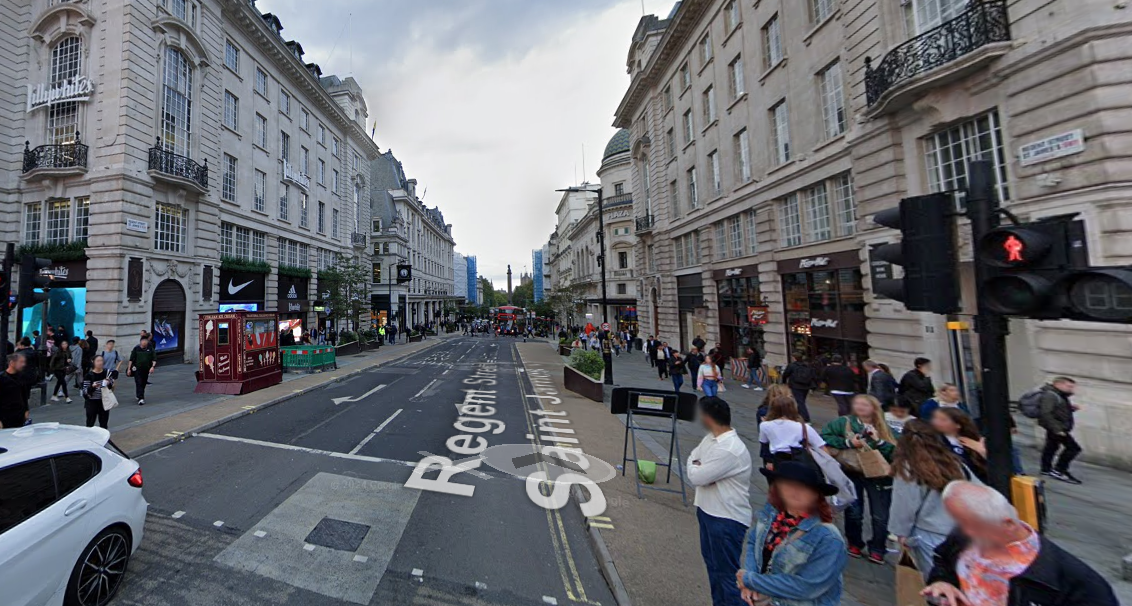A London taxi trade group has warned proposed changes to part of the West End will limit access to dozens of hotels and restaurants and displace traffic to nearby roads.
Karen Proctor, Chair of the United Cabbies Group, wrote in a response to the Regent Street, Haymarket and Piccadilly Circus scheme that the plans as detailed risk “trading a perceived short-term aesthetic gain for long-term urban dysfunction”.
A spokesperson for Westminster City Council and The Crown Estate, which are working together on the proposals, said taxis are “integral to the West End’s transport network”, adding feedback from groups including taxi drivers “is helping us build a clear picture of the priorities and concerns we need to address”.
Under the plans published last month Regent Street St James’s would go traffic free and the pedestrian space at Piccadilly Circus would be greatly enlarged.
Other changes would include introducing two-way traffic to Haymarket and a “public realm update” to Regent Street.
A consultation was run by the council and The Crown Estate, ending on August 10.
Nearly 3,500 people took part in the online survey, with a public engagement summary report to be published this autumn.
The council has said the draft masterplan reimagines architect John Nash’s ambition as detailed 200 years ago to connect St James’s Park with Regent’s Park.
It is also hoped it will complement London Mayor Sir Sadiq Khan’s plans to pedestrianise nearby Oxford Street.
In its submission to the consultation, shared with the Local Democracy Reporting Service (LDRS), United Cabbies Group however raised concerns about several elements of the scheme.
“While we commend the intention to enhance London’s urban environment and support the overarching aim of making the area a world-class destination, we are deeply troubled by the severe and far-reaching implications that these proposals, in their current form, will have for access, traffic flow, public mobility, and the economic vibrancy of the West End,” it reads.
“Regent Street is not only one of London’s most iconic thoroughfares but also a vital artery in the life of the capital. It links the West End’s retail district with essential transport and business infrastructure. Any proposals to alter its configuration must, therefore, meet the highest standards of scrutiny, balancing the needs of visitors, residents, businesses, and vulnerable groups alike.”
Ms Proctor, who submitted the objection on behalf of the group, wrote at the heart of its concerns is that the proposed changes “will fundamentally undermine licensed taxi access for a wide range of users”.
If implemented as planned, Ms Proctor claimed the scheme would remove access to dozens of hotels, restaurants, shops and venues and move heavy traffic to other roads worsening congestion.
Among the hotels listed as likely to be cut off are The Londoner, Haymarket Hotel and Thistle Piccadilly.
Ms Proctor wrote: “A thriving city must be inclusive. The current proposals risk making central London less accessible to those who are already at risk of exclusion. The cultural institutions, shops, and social spaces that make Regent Street unique should be open and welcoming to all, not just those able and willing to travel on foot or by bicycle.
“To be truly inclusive urban enhancement must recognise the diverse needs of all potential users, not just the young and able-bodied. Plans that overlook these requirements fail in their most fundamental duty to the public good.”
A spokesperson for Westminster City Council and The Crown Estate said: “Taxis are integral to the West End’s transport network and allow people, including those with disabilities, older residents, busy Londoners and visitors, to choose how to move from place to place.
“We’re in regular dialogue with the Licensed Taxi Drivers’ Association (LTDA), and a significant number of taxi drivers have taken part in our recent consultation, which recently closed. That feedback, alongside input from residents, businesses and visitors, is helping us build a clear picture of the priorities and concerns we need to address.
“Our aim is to design streets that work for everyone. That means ensuring passengers and drivers can access the kerbside where it matters most to their customers, while also improving safety, cutting congestion and creating a more welcoming West End. Taxis are part of that future, and we’re committed to making sure the final designs reflect their vital role.”
📩
Get the latest breaking news, roadworks, crime updates and local events straight to your inbox – totally free, every day.
SIGN UP below

